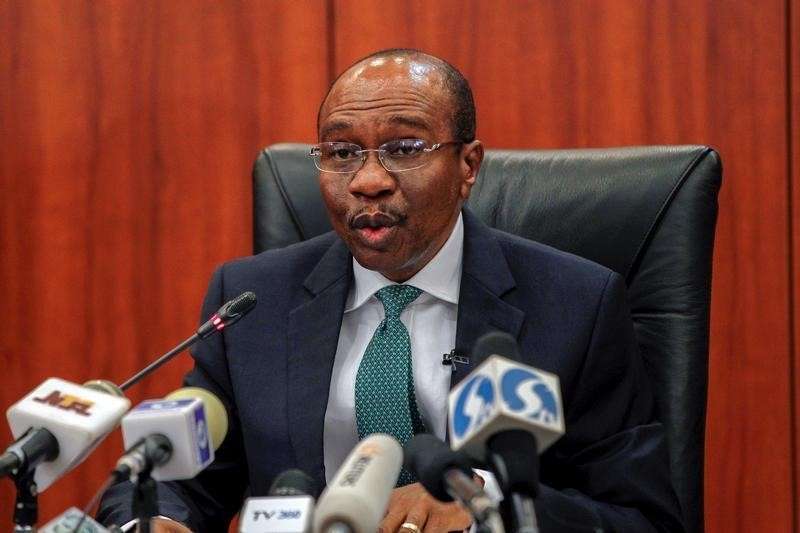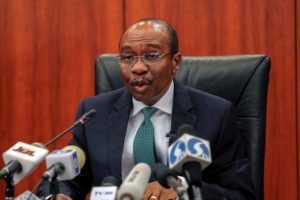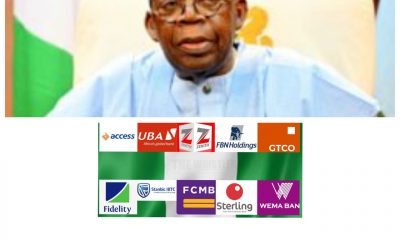Economy
FG Flings 41 Items Exempted From Forex Policy By CBN


By Dipo Olowookere
There are strong indications that the Federal Government may set aside the policy of the Central Bank of Nigeria (CBN) regarding the 41 items exempted from foreign exchange market in its newly released 2017 Fiscal Policy Roadmap.
The policy document prepared by the Minister of Finance, Mrs Kemi Adeosun, will, instead, come up with fiscal measures to reduce pressure in the parallel market.
According to the document, the FG “will replace administrative measures on list of 41-items with fiscal measures to reduce demand pressure in parallel market.”
Presenting the document at a programme held in Lagos, Mrs Adeosun said, “The Federal Government’s Fiscal Roadmap is addressing barriers to growth that will drive productivity, generate jobs and broaden wealth-creating opportunities to achieve inclusive growth.”
She stated that the President Muhammadu Buhari administration was determined to return Nigeria to a productive economy rather than one steeped in consumption. To do so, government would tackle the infrastructure deficit to unlock productivity, improve business competitiveness and create employment.
She further said that government would actively partner with the private sector to achieve this by use of a number of new funding platforms, including the Road Trust Fund, which would develop potentially tollable roads, and the Family Homes Fund, which is an ongoing PPP initiative for funding of affordable housing.
According to the minister, the tax provision that allows companies to receive tax relief for investment in roads on a collective basis would be reviewed.
She explained that the existing provision that enabled companies to claim relief for road projects had only been taken advantage of by two companies, Lafarge and Dangote Cement. This was because few companies were large enough to fund roads alone.
The revision would now allow collective tax relief, such that companies will be able to jointly fund roads, subject to approval by FIRS and the Ministry of Works, and share the tax credit. It added that the government would revitalise refineries and increase Diaspora remittances through participation in the buyer support scheme for the Family Homes Fund with a view to increasing the supply of US Dollars to the Nigerian market.
The Roadmap also provides for a fresh audit of the federal government debt profile after which it would introduce a promissory note program to finance verified liabilities and issue debt certificates to contractors of Ministries, Departments and Agencies (MDAs).
These, according to the document, would positively impact on the economy by improving government’s cash flow of businesses, improve banks’ Non-Performing Loans, (NPLs); free up banks’ balance sheet for lending to private sector; and improve business interaction. These liabilities were estimated to be N2.2 trillion and would be addressed with a 10 year Promissory Note Issuance programme in conjunction with the CBN.
“Some contractors had not been paid in the past 4 years and in some cases the banks they were owing refused them access to the funds released, causing delays,” she explained, adding that those receiving the Promissory Notes would be expected to provide a material discount to government. The issuance was a solution to a long term problem that was ‘a drag on economic activity’.
It would also mobilise private capital to complement government spending on infrastructure, through the Roads Trust Fund, Family Homes Fund, while extending infrastructure tax relief to a collective model to attract clusters of corporate entities and expand the provision of infrastructure, in other to drive growth of non-oil sector, especially and the economy in general. There would be incentives for exports which would include restructuring the Export Expansion Grant (EEG) to a tax credit system, as well as rationalised tariffs and waivers in key export sectors. These have been designed to drive import substitution. The document indicated that the federal government would encourage investment in specific sectors through fiscal incentives especially in food processing, mining and power, and would rationalise tariffs and waivers in such priority sectors. In order to expand fiscal space through revenue enhancement and cost consolidation, it would enhance the Customs Single Window (being implemented through a Private Public Partnership (PPP) scheme), introduce template for non-allowable expenses for government agencies, control overhead costs by the Efficiency Unit and implement a continuous risk based audit by the Presidential Initiative on Continuous Audit.
In order to improve fiscal discipline at Sub-National level, the federal government would, from next year, extend the Efficiency Unit to Sub-National level; fast track municipal bond issues to deepen the bond market, as well as conversion to International Public Sector Accounting Standards by all state governments. The government plans to pursue its anti-corruption crusade in the new year with greater vigour and accelerate recoveries process, introduce a whistle-blower scheme, centralised database on recovered assets, asset tracking and a professional management of recovered assets. It also plans to rebalance debt portfolio to extend maturity and optimise debt service cost through rebalancing public debt portfolio with increased external borrowing with a target of 60:40 ratio and extend maturity profile of public debt portfolio, while deploying long-term debt instruments and depending more on concessionary loans.
http://www.vanguardngr.com/2016/12/41-exempted-items-fg-dumps-cbns-forex-policy/
Economy
FG Targets Credit Access For 50% Workers By 2030

By Adedapo Adesanya
The Vice President, Mr Kashim Shettima, inaugurated the Board of the Nigerian Consumer Credit Corporation (CREDICORP) and gave a 50 per cent access target for workers, saying consumer credit was critical to Nigeria’s ambition of becoming a one-trillion-dollar economy by 2030.
According to him, President Bola Tinubu established the CREDICORP to build a trusted credit infrastructure, provide catalytic capital to lower borrowing costs, and help Nigerians overcome long-standing cultural resistance to credit.
Speaking on Thursday in Abuja when he inaugurated the board on behalf of the President, the Vice President, in a statement by his spokesman, Mr Stanley Nkwocha, said that the quality of life of Nigerians cannot improve without closing the gap between access to capital and human dignity.
“A civil servant who earns honestly does not have to chase sudden wealth just to buy a vehicle, or save for ten years to buy one. A young professional should not remain in darkness simply because solar power must be paid for all at once,” the Vice President said.
VP Shettima disclosed that in just one year of operations, CREDICORP has disbursed over ₦37 billion in consumer credit to more than 200,000 Nigerians, with over half of them accessing formal credit for the first time.
The Vice President said the organisation was specifically tasked with building credit infrastructure to bridge the trust gap between lenders and borrowers, providing wholesale capital and credit guarantees through its portfolio company.
“Ultimately, these critical jobs of CREDICORP will enable access to consumer credit to at least 50 per cent of working Nigerians by 2030,” he said.
The Vice President explained that the new board’s role was not ceremonial as they are custodians of the organisation’s mission, adding that the long-term strength of the institution would depend on their “vigilance, integrity, sacrifice, and commitment.”
He directed Board members to uphold Public Service Rules, the Board Charter, and all applicable governance frameworks, warning that accountability and stewardship of public resources were non-negotiable.
The Chairman of CREDICORP, Mr Aderemi Abdul, expressed appreciation to President Tinubu for his vision behind the formation of CREDICORP and for the confidence reposed in them, noting that the establishment of the corporation marked an important step towards strengthening the nation’s financial architecture.
He assured President Tinubu that the board understands its responsibility and will guide the institution to deliver meaningful benefits to Nigerians.
For his part, Mr Uzoma Nwagba, Managing Director/CEO of CREDICORP, recalled watching President Tinubu say 20 years ago that consumer credit is one of the major tools that will improve the lives of Nigerians.
He noted that over the past 18 months, the institution has benefited more than 200,000 Nigerians, including students.
He assured that the presidential vision behind CREDICORP would not be taken lightly, as the team considers their appointments a unique, once-in-a-lifetime opportunity.
Other members of the board inaugurated include Mrs Olanike Kolawole, Executive Director, Operations; Mrs Aisha Abdullahi, Executive Director, Credit and Portfolio Management; Mr Armstrong Ume-Takang (MD, MoFI), Representative of MoFI; Mrs Bisoye Coke-Odusote (DG, NIMC), Representative of NIMC; and Mr Mohammed Naziru Abbas, Representative of FMITI.
Others are Mr Marvin Nadah, Representative of FCCPC; Mrs Chinonyelum Ndidi, Representative of the Federal Ministry of Finance; Mr Mohammed Abbas Jega, Independent Director; and Mrs Toyin Adeniji, Independent Director.
Economy
NASD OTC Exchange Rallies 0.23% as Nipco Leads Six Advancers

By Adedapo Adesanya
Six price gainers helped the NASD Over-the-Counter (OTC) Securities Exchange retain its stay in green territory after a 0.23 per cent appreciation on Thursday, February 26.
The price gainers were led by Nipco Plc, which added N25.00 to close at N278.00 per share compared with the previous day’s N253.00 per share, NASD Plc rose by N5.13 to N56.41 per unit versus N51.28 per unit, FrieslandCampina Wamco Nigeria Plc expanded by N2.24 to N102.44 per share from N100.00 per share, Afriland Properties Plc grew by 88 Kobo to N18.88 per unit from N18.00 per unit, 11 Plc increased by 35 Kobo to N277.00 per share from N276.65 per share, and Lagos Building Investment Company (LBIC) Plc gained 27 Kobo to close at N3.75 per unit versus N3.48 per unit.
On the flip side, Central Securities Clearing System (CSCS) Plc lost N1.75 to sell at N68.25 per share versus N70.00 per share, and Geo-Fluids Plc depreciated by 2 Kobo to N3.25 per unit from N3.27 per unit.
The weight of the advancers fortified the NASD Unlisted Security Index (NSI) by 9.21 points to 4,034.46 points from 4,025.25 points, and the market capitalisation soared by N5.51 billion to N2.413 trillion from Wednesday’s N2.408 trillion.
Yesterday, the transaction value jumped by 18.8 per cent to N102.8 million from N80.7 million, and the number of deals surged by 18,8 per cent to 38 deals from 32 deals, while the transaction volume went down by 84.9 per cent to 1.3 million units from 8.7 million units.
At the close of business, CSCS Plc was the most traded stock by value (year-to-date) with 34.2 million units worth N2.04 billion, followed by Okitipupa Plc with 6.3 million units sold for N1.1 billion, and Geo-Fluids Plc with 122.1 million units valued at N478.2 million.
Resourcery Plc remained as the most traded stock by volume (year-to-date) with 1.05 billion units exchanged for N408.7 million, trailed by Geo-Fluids Plc with 122.1 million worth N478.2 million, and CSCS Plc with 34.2 million units traded for N2.04 billion.
Economy
Naira Down Again at NAFEX, Trades N1,359/$1

By Adedapo Adesanya
The Naira further weakened against the Dollar in the Nigerian Autonomous Foreign Exchange Market (NAFEX) for the fourth straight session this week on Thursday, February 26.
At the official market yesterday, the Nigerian Naira lost N3.71 or 0.27 per cent to trade at N1,359.82/$1 compared with the previous session’s N1,356.11/$1.
In the same vein, the local currency depreciated against the Pound Sterling in the same market window on Thursday by N8.27 to close at N1,843.23/£1 versus Wednesday’s closing price of N1,834.96/£1, and against the Euro, it crashed by N8.30 to quote at N1,606.89/€1, in contrast to the midweek’s closing price of N1,598.59/€1.
But at the GTBank forex desk, the exchange rate of the Naira to the Dollar remained unchanged at N1,367/$1, and also at the parallel market, it maintained stability at N1,365/$1.
The continuation of the decline of the Nigerian currency is attributed to a surge in foreign payments that have outpaced the available Dollars in the FX market.
In a move to address the ongoing shortfall at the official window, the Central Bank of Nigeria (CBN) intervened by selling $100 million to banks and dealers on Tuesday.
However, the FX support failed to reverse the trend, though analysts see no cause for alarm, given that the authority recently mopped up foreign currency to achieve balance and it is still within the expected trading range of N1,350 and N1,450/$1.
As for the cryptocurrency market, major tokens posted losses over the last 24 hours as traders continued to de-risk alongside equities following Nvidia’s earnings-driven pullback, with Ripple (XRP) down by 2.7 per cent to $1.40, and Dogecoin (DOGE) down by 1.6 per cent to $0.0098.
Further, Litecoin (LTC) declined by 1.3 per cent to $55.87, Ethereum (ETH) slipped by 0.9 per cent to $2,036.89, Bitcoin (BTC) tumbled by 0.7 per cent to $67,708.21, Cardano (ADA) slumped by 0.6 per cent to $0.2924, and Solana (SOL) depreciated by 0.4 per cent to $87.22, while Binance Coin (BNB) gained 0.4 per cent to sell for $629.95, with the US Dollar Tether (USDT) and the US Dollar Coin (USDC) closing flat at $1.00 each.
-

 Feature/OPED6 years ago
Feature/OPED6 years agoDavos was Different this year
-
Travel/Tourism10 years ago
Lagos Seals Western Lodge Hotel In Ikorodu
-

 Showbiz3 years ago
Showbiz3 years agoEstranged Lover Releases Videos of Empress Njamah Bathing
-

 Banking8 years ago
Banking8 years agoSort Codes of GTBank Branches in Nigeria
-

 Economy3 years ago
Economy3 years agoSubsidy Removal: CNG at N130 Per Litre Cheaper Than Petrol—IPMAN
-

 Banking3 years ago
Banking3 years agoSort Codes of UBA Branches in Nigeria
-

 Banking3 years ago
Banking3 years agoFirst Bank Announces Planned Downtime
-

 Sports3 years ago
Sports3 years agoHighest Paid Nigerian Footballer – How Much Do Nigerian Footballers Earn























